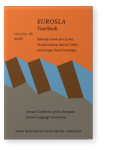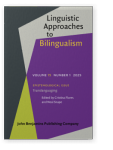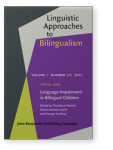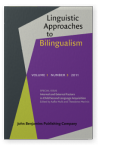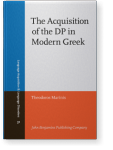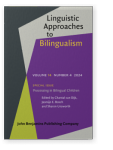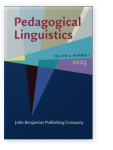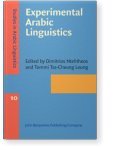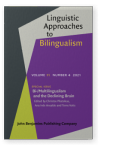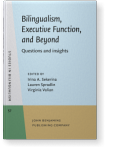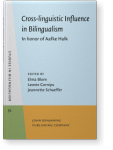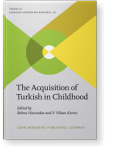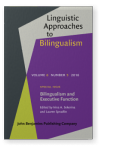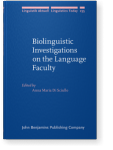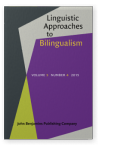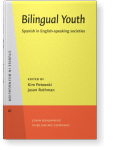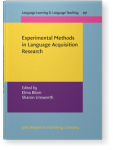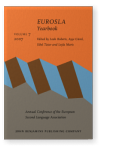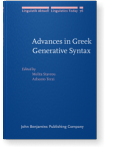Theodoros Marinis
List of John Benjamins publications for which Theodoros Marinis plays a role.
Yearbook
Journal
ISSN 1879-9264 | E-ISSN 1879-9272
Titles
Language Impairment in Bilingual Children: State of the art 2017
Edited by Theodoros Marinis, Sharon Armon-Lotem and George Pontikas
Special issue of Linguistic Approaches to Bilingualism 7:3/4 (2017) v, 211 pp.
Subjects Cognition and language | Cognitive psychology | Language acquisition | Multilingualism | Psycholinguistics | Theoretical linguistics
Internal and External Factors in Child Second Language Acquisition
Edited by Aafke Hulk and Theodoros Marinis
Special issue of Linguistic Approaches to Bilingualism 1:3 (2011) v, 139 pp.
Subjects Language acquisition | Multilingualism | Sociolinguistics and Dialectology
The Acquisition of the DP in Modern Greek
Theodoros Marinis
[Language Acquisition and Language Disorders, 31] 2003. xiv, 261 pp.
Subjects Generative linguistics | Language acquisition | Other Indo-European languages | Syntax | Theoretical linguistics
2024 Sentence processing in bilingual children: Evidence from garden-path sentences Processing in Bilingual Children, Dijk, Chantal van, Jasmijn E. Bosch and Sharon Unsworth (eds.), pp. 476–511 | Article
Research in sentence processing in bilingual children is emergent but incomplete as very few studies examine the processing of structurally complex sentences or bilingual children’s real-time interpretation of sentences. One underexplored linguistic feature which can offer insights in this… read more
2023 Second language grammar learning in refugee children: Is group dictation an effective teaching technique? Pedagogical Linguistics 4:1, pp. 50–76 | Article
This exploratory study aims to investigate the effectiveness of group dictation in primary school children with a refugee background. More specifically, running dictation was employed in the teaching of two grammatical phenomena in L2 Greek, tense and gender agreement. Two studies were conducted… read more
2021 Sentence repetition in children with autism spectrum disorder in Saudi Arabia: An investigation of morphosyntactic abilities Experimental Arabic Linguistics, Ntelitheos, Dimitrios and Tommi Tsz-Cheung Leung (eds.), pp. 143–176 | Chapter
This study investigated the morphosyntactic abilities of Saudi Arabic-speaking children with Autism Spectrum Disorder (ASD) using a Saudi Arabic Sentence Repetition Task (Saudi-SRT) developed for this study. The first objective of the study was to determine whether Saudi Arabic-speaking children… read more
2021 Multiple sclerosis and bilingualism: Some initial findings Bi-/Multilingualism and the Declining Brain, Pliatsikas, Christos, Ana Inés Ansaldo and Toms Voits (eds.), pp. 551–577 | Article
It has been suggested that bilingualism is beneficial for executive control and could have positive long-term effects by delaying the onset of symptoms of degenerative diseases. This research investigates, for the first time, the impact of bilingualism on executive control (monitoring and… read more
2019 Chapter 11. Effects of dense code-switching on executive control Bilingualism, Executive Function, and Beyond: Questions and insights, Sekerina, Irina A., Lauren Spradlin and Virginia Valian (eds.), pp. 161–180 | Chapter
Bilingualism is reported to re-structure executive control networks, but it remains unknown which aspects of the bilingual experience cause this modulation. This study explores the impact of three code-switching types on executive functions: (1) alternation, (2) insertion, and (3) dense… read more
2019 Chapter 12. Predicting executive functions in bilinguals using ecologically valid measures of code-switching behavior Bilingualism, Executive Function, and Beyond: Questions and insights, Sekerina, Irina A., Lauren Spradlin and Virginia Valian (eds.), pp. 181–206 | Chapter
One of the factors claimed to impact executive functions in bilinguals is code-switching. New insights into how exactly code-switching affects executive functions can be obtained if attention is paid to the kind of code-switching bilinguals engage in, and not just the frequency of code-switching.… read more
2017 Language impairment in bilingual children: State of the art 2017 Language Impairment in Bilingual Children: State of the art 2017, Marinis, Theodoros, Sharon Armon-Lotem and George Pontikas (eds.), pp. 265–276 | Introduction
2017 The impact of transparency and morpho-phonological cues in the acquisition of grammatical gender in sequential bilingual children and children with Specific Language Impairment: A cross-linguistic study Cross-linguistic Influence in Bilingualism: In honor of Aafke Hulk, Blom, Elma, Leonie Cornips and Jeannette Schaeffer (eds.), pp. 153–180 | Chapter
2016 L2 children do not fluctuate: Production and on-line processing of indefinite articles in Turkish-speaking child learners of English The Acquisition of Turkish in Childhood, Haznedar, Belma and F. Nihan Ketrez (eds.), pp. 361–388 | Article
In this study, we examined whether Turkish-speaking child L2 learners of English omitted or substituted indefinite articles in a production task that comprised a referential specific and a non-referential predicational semantic context. We also examined the source of children’s errors using a… read more
2016 Effects of dense code-switching on executive control Bilingualism and Executive Function: An interdisciplinary approach, Sekerina, Irina A. and Lauren Spradlin (eds.), pp. 648–668 | Article
Bilingualism is reported to re-structure executive control networks, but it remains unknown which aspects of the bilingual experience cause this modulation. This study explores the impact of three code-switching types on executive functions: (1) alternation, (2) insertion, and (3) dense… read more
2016 Syntax and its interfaces at the low and high ends of the autism spectrum Biolinguistic Investigations on the Language Faculty, Di Sciullo, Anna Maria (ed.), pp. 195–212 | Article
Studies on the language abilities in autism spectrum disorders (ASD) have tended to include individuals across the spectrum, with the consequence that the ensuing picture is rarely clear. Most recent studies setting apart individuals at the lower end of the autism spectrum have discovered severe… read more
2011
The present study investigates the effects of child internal (age/time) and child external/environmental factors on the development of a wide range of language domains in successive bilingual (L2) Turkish-English children of homogeneously low SES. Forty-three L2 children were tested on… read more
2011 9. Voicing language dominance: Acquiring Spanish by British English/Spanish bilingual children Bilingual Youth: Spanish in English-speaking societies, Potowski, Kim and Jason Rothman (eds.), pp. 227–248 | Article
This paper investigates the linguistic performance of a group of English-Spanish bilingual children (N = 44, age range: 10–14) with different degrees of language dominance in their use of the Spanish preposition ‘a’ using a completion task which measures the different conditions that relate to the… read more
2011
2010 Chapter 7. Using on-line processing methods in language acquisition research Experimental Methods in Language Acquisition Research, Blom, Elma and Sharon Unsworth (eds.), pp. 139–162 | Chapter
2007 Acquiring phenomena at the syntax/semantics interface in L2 Spanish: The personal preposition a EUROSLA Yearbook: Volume 7 (2007), Roberts, Leah, Ayşe Gürel, Sibel Tatar and Leyla Martı (eds.), pp. 67–88 | Article
Recent second language (L2) acquisition research has proposed that purely syntactic features are easier to acquire and less vulnerable than ones involving the interfaces (Sorace, 2004; Serratrice et al. 2004). The present paper addresses this issue by investigating the acquisition of the Spanish… read more
2005 Subject-object asymmetry in the acquisition of the definite article in Greek Advances in Greek Generative Syntax: In honor of Dimitra Theophanopoulou-Kontou, Stavrou, Melita and Arhonto Terzi (eds.), pp. 153–178 | Article
